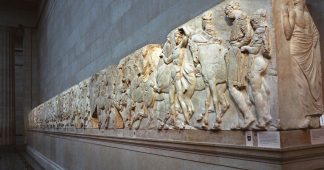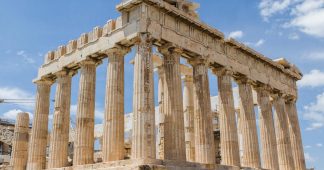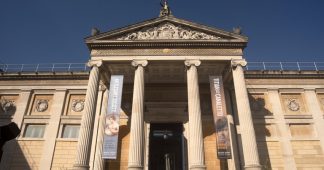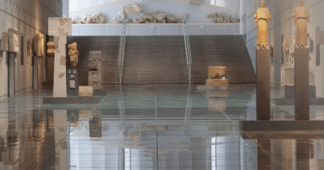Tasos Kokkinidis
Greece responded on Friday to Prime Minister of the United Kingdom Boris Johnson, who had earlier ruled out the return of the Parthenon Marbles to Athens, saying that he had not been properly informed.
In a statement, Greece’s Minister of Culture Lina Mendoni said that the British PM is is not aware of the new historical data, which prove that Lord Elgin did not legitimately acquire the Marbles.
She adds that the new data “show that there has was never a legitimate acquisition of the Parthenon Sculptures by Lord Elgin and, therefore, neither has the British Museum ever acquired the Sculptures in a legitimate manner.”
“The Ministry of Culture and Sports can provide the necessary documentary evidence that can inform the British people that the British Museum possesses the Sculptures illegally,” Mendoni says in her statement.
She concludes by stressing that the “British Museum does not have legitimate ownership or possession of the Sculptures.
“The Parthenon, as a symbol of UNESCO and Western Civilisation, reflects universal values. We are all obliged to work towards this direction.”
Earlier, in a statement to Greek newspaper Ta Nea, Johnson ruled out the return of the Parthenon Marbles to Greece.
“The British government has a firm and long-standing position on the sculptures: they were legally acquired by Lord Elgin, in accordance with the laws in force at the time.”
He added that he understands the strong feelings of the Greek people and Prime Minister Kyriakos Mitsotakis on this issue.
However, he opines that “The rightful owners are the commissioners of the British Museum since they came into their possession.”
Johnson’s statement seemingly puts an end to speculation that Britain could consider the return or lending of the Marbles at a time when Greece is celebrating 200 years of the War of Independence.
Parthenon Marbles and historical facts
The British Parliament, even back in 1816, wanted to be sure that Lord Elgin had authority to remove the Parthenon marbles, and insisted on the production of a document.
One third of them had very serious reservations about the legality — or morality — of the taking of the marbles out of Greece, and they insisted on a document.
And a document called a firman was indeed produced — in Italian.
According to many experts, the document the British Museum refers to as a firman is not an actual firman at all.
Professor Dr. Zeynep Aygen, the author of the book “International Heritage and Historic Building Conservation: Saving the World’s Past,” has stated that “the letter in the Italian language is not a firman at all; there is no way that it can be accepted as a firman.”
She explained to Greek Reporter that “the Ottoman Court would not give a letter (written) in the Italian language… we do not know where the original of the letter is.”
Dr. Aygen maintains that “a firman is a royal document with a number of special signs. Therefore it is clear that the letter in the Italian language is not a firman approved by the Sultan and not a “buyruldu” by the Grand Vizier.
“In both cases the necessary format is missing from the aforementioned letter.”
Greek proposal for the Parthenon Marbles
In 2019, Mitsotakis called on his British counterpart to engage in a massive cultural swap:
To allow treasures that have never been shown abroad before to be exhibited in London in exchange for the Parthenon Marbles being returned to Athens for the 2021 celebrations.
Speaking to British newspaper The Observer, Mitsotakis said he was willing to allow treasures that have never been shown abroad before to be exhibited in London in exchange for the Parthenon Marbles being returned to Athens for 2021.
“Our wish and ambition is to create the necessary conditions for Greek cultural heritage to travel the world and in so doing convey the great and essential contribution of our country to western civilization,” he said.
“In this context, given the significance of 2021, I will propose to Boris: ‘As a first move, loan me the sculptures for a certain period of time and I will send you very important artefacts that have never left Greece to be exhibited in the British Museum’.”
Published at greekreporter.com











